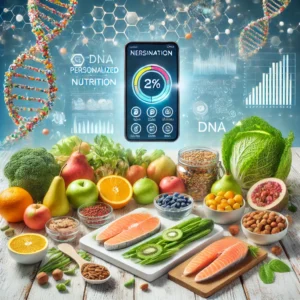
Personalized Nutrition and Health A Science-Driven Approach to Well-Being
In an era where one-size-fits-all diets are becoming outdated, personalized nutrition is revolutionizing how we approach health and wellness. With advancements in technology, genetics, and data science, we can now tailor dietary recommendations based on an individual’s unique biology, lifestyle, and preferences. This cutting-edge approach aims to optimize health, prevent chronic diseases, and improve overall well-being.
What is Personalized Nutrition?
Personalized nutrition is a tailored dietary approach that considers factors such as:
- Genetics – How your DNA influences nutrient metabolism and food sensitivities.
- Microbiome Composition – The bacteria in your gut play a significant role in digestion and overall health.
- Metabolic Response – Your body’s reaction to different macronutrients like carbohydrates, fats, and proteins.
- Lifestyle & Preferences – Daily habits, physical activity, cultural background, and dietary choices.
By analyzing these factors, nutrition plans can be customized to maximize benefits and address specific health concerns.
The Role of Genetics in Nutrition
Genetic testing has uncovered that individuals metabolize food differently based on their DNA. For instance:
- Some people are fast caffeine metabolizers, while others are slow, affecting energy levels and sleep quality.
- Lactose intolerance is linked to genetic variations affecting dairy digestion.
- Gluten sensitivity and metabolic disorders may have genetic predispositions that influence dietary recommendations.
With this knowledge, personalized nutrition can guide individuals toward food choices that support their unique genetic makeup.
The Power of Gut Health
The gut microbiome consists of trillions of bacteria that influence digestion, immunity, and even mental health. Personalized nutrition plans can:
- Identify foods that promote healthy gut bacteria.
- Reduce inflammation by avoiding specific triggers.
- Improve digestion and nutrient absorption.
Microbiome testing allows individuals to understand which foods benefit their gut health and which should be avoided.
Technology and Personalized Nutrition
Thanks to digital advancements, tracking and analyzing personal health data has never been easier. Tools such as:
- Wearable devices monitor glucose levels, heart rate, and metabolism.
- AI-driven meal planners recommend foods based on real-time health data.
- Blood and microbiome testing kits offer insights into nutrient deficiencies and metabolic efficiency.
These technologies empower individuals to make informed dietary choices for better health outcomes.
Benefits of Personalized Nutrition
- Improved Digestion & Absorption – Tailoring food choices can enhance nutrient uptake.
- Better Weight Management – Eating according to your metabolism leads to sustainable weight control.
- Reduced Risk of Chronic Diseases – Prevent conditions like diabetes, heart disease, and hypertension.
- Enhanced Mental & Physical Performance – The right nutrients boost cognitive function and energy levels.
- Greater Food Enjoyment – Eating what suits your body reduces discomfort and cravings.
The Future of Personalized Health
As research advances, AI, biometrics, and precision medicine will further refine personalized nutrition, making it accessible and effective for everyone. The future holds the potential for DNA-based meal plans, smart supplements, and hyper-personalized diets that evolve in real-time with your body’s needs.
Final Thoughts
Personalized nutrition is not just a trend—it’s the future of health and wellness. By understanding your body’s unique requirements, you can make smarter dietary choices that enhance longevity, energy, and overall quality of life. With science on our side, achieving optimal health has never been more attainable.
